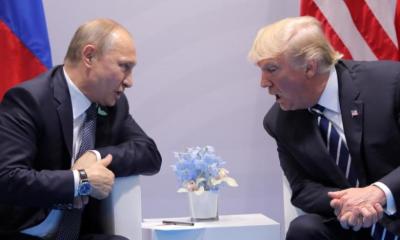Russia Collusion Confusion: 5 Essential Unanswered Questions

After fingers pointed toward Russia when thousands of Hillary Clinton's emails were leaked by Wikileaks right before the 2016 election, Americans have been wondering and speculating if the Trump campaign colluded at all with the Russian government to influence the election.
But since it's been reported that the Clinton campaign and the Democratic National Committee funded the research that was used in the highly controversial private intelligence dossier in January that alleged that the Trump campaign had possible coordination with the Kremlin, many don't know what to think about the web of confusion that has been spun around the Russia collusion storyline.
Here are five essential unanswered questions to ask about the Russian collusion confusion.
1. Did the Trump campaign collude with Russia?
Last week's announcement of the indictment of former Trump campaign chair Paul Manafort for "conspiracy against the United States" — for work he did between 2012 and 2014 — has seemingly added more fuel to the national conservation over whether or not the Trump campaign colluded with the Russian government to influence the outcome of the 2016 presidential election.
Special Counsel Robert Mueller's indictment of Manafort seemingly has less to do with Manafort's involvement in the Trump campaign and more to do with an elaborate tax-evasion scheme by Manafort and his partner Rick Gates to hide millions in foreign income earned from his personal dealings with former Ukrainian President Victor Yanukovych and his pro-Russian Party of Regions from the U.S. government.
Conservative Trump critic David French notes in the National Review that on its face, the Manafort indictment has nothing to do with the Trump campaign. But as French adds, it remains to be seen whether Mueller will use Manafort's indictment "as leverage" to force Manafort to cooperate with the bigger investigation into alleged links between the Russian government and Trump campaign officials.
In trying to answer the question of whether or not the Trump campaign colluded with the Russian government, one might be better off looking at the "statement of offense" issued after former Trump campaign foreign policy advisor George Papadopoulos admitted in early October that he provided false statements when interviewed by the FBI in January.
Papadopoulos admitted that he provided false information to the FBI about his dealings with a professor with ties to Russian government officials who later claimed to have "dirt" on Democratic presidential nominee Hillary Clinton "in the form of 'thousands of emails.'"
According to court documents, Papadopoulos met with the professor and a woman believed to be Russian President Vladmir Putin's niece in London on March 24, 2016, right around the same time he joined the Trump campaign.
On April 26, 2016, Papadopoulos met the professor for breakfast in a London hotel where the professor told him that he had just met with a high level Russian official and learned that "Russians had obtained 'dirt' on then-candidate Clinton."
Although Papadopoulos' admission and statement of offense does not provide the smoking gun of proof that the Trump campaign colluded with Russians, French argues that it does "raise serious questions" and demonstrates "how little we truly know about the Mueller investigation."
"It seems from the statement of offense that the bulk of the contacts between Papadopoulos and his Russian intermediaries involved his efforts to set up the meeting between Trump and Putin, activity that's certainly legitimate," French wrote. "But [Papadopoulos] also pushed to set up a meeting between Trump-campaign representatives and 'members of president putin's office and the [Russian Ministry of Foreign Affairs].'"
In June, The Wall Street Journal published reports that questioned whether Trump's former National Security Advisor Michael Flynn, who played a pivotal role in Trump's campaign, participated in efforts to contact hackers believed to have stolen emails from Clinton.
In August, it was reported that Mueller was looking to investigate the role, if any, that Flynn played in the effort to obtain Clinton's emails from hackers.





















